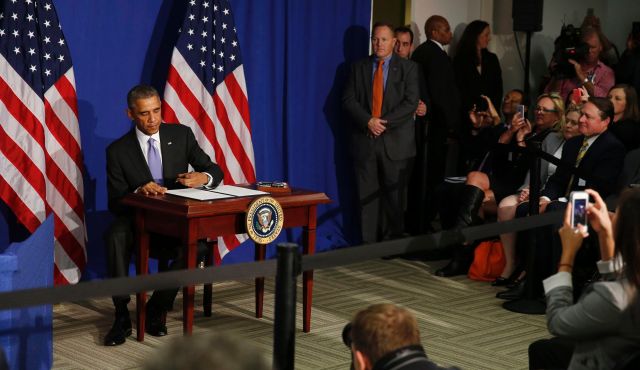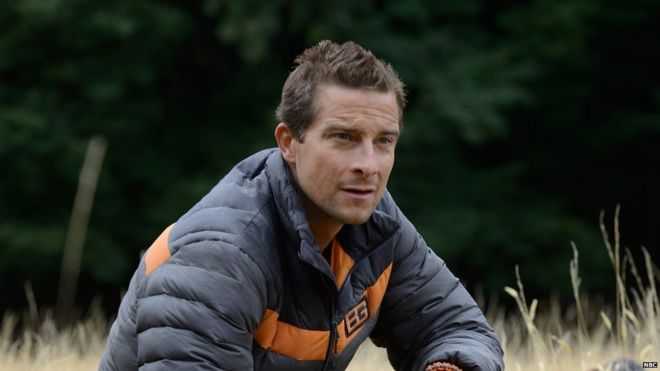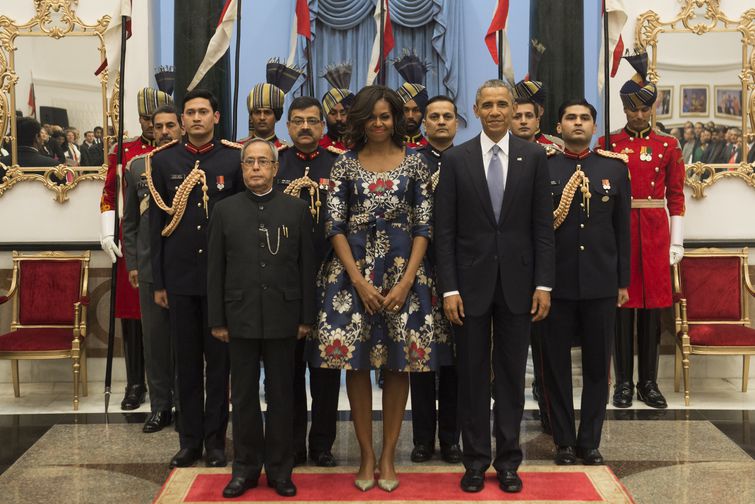
With House of Cards, Kevin Spacey helped change the way we watch TV. Now he wants to change the way we look at the planet.
Kevin Spacey takes 10 seconds to dispense with the pleasantries and get down to business. It’s “Hey, how are you?” and then straight to the point, the way his character does it on House of Cards.
“You have to remember, it was just 10 or 11 years ago that everybody thought I was fucking crazy when I decided to pick up and move to London to run a theater company,” he says, referring to his recently completed stint as artistic director of the Old Vic in London’s West End. “I did my job there, and now it’s time to go.” Spacey was seven seasons in when he found the role that made him streaming media’s first superstar, as ruthless politician Frank Underwood on the binge-worthy Netflix drama. You can hear pride swelling in that cosmopolitan purr as Spacey takes in the fact that House of Cards is more popular in its third season than ever. “All those reports over the years that my career was over, that I was done, that I’d run away from Hollywood, they now sound rather….”
Shortsighted? Absurd? Spacey, 55, doesn’t need to finish the thought. The lesson is: Never count out a man of determination and style. The actor spent the 1990s charting a course to international stardom with lead roles in celebrated films like The Usual Suspects (which won him his first Oscar, for best supporting actor, in 1996), L.A. Confidential, and American Beauty (which earned him his second, for best actor, in 2000). A few years later, he was convincing interviewers that he’d had enough. “I love the performing part of being an actor,” he told me over lunch not long after taking the Old Vic job, “but the other bullshit is much, much less interesting to me.”

Hail to the chief: Kevin Spacey moves into the Oval Office in Season 3 of House of Cards.
Leave it to Spacey to find a way back to the top that upends any standard approach. He is both the main character and co-executive producer on House of Cards, a show that’s been a big red disrupter to both network and cable TV. (It’s the first Emmy-winning series not shown on cable or regular broadcast TV.) What made him do it? “The script was fantastic, David Fincher [co-executive producer and director of Gone Girl and The Social Network] is a genius, and I liked that it was a brave thing to do,” he says. The series did not have a pilot, it doesn’t rely on commercials or arcane Nielsen data, and there’s never any wait time for “next week’s episode” since an entire season rolls out at once. That last detail has spurred something of a revolution in how we consume entertainment. “I’m not a binge-watcher myself, but I understand the addiction completely,” Spacey says. He’s at home in London, where he spent the predawn hours glued to the Australian Open Tennis Championships beaming live from Melbourne. “People watch what they watch,” he says. “The audience doesn’t care how they get their content. They just want it to be good.”
House of Cards won three Primetime Emmy Awards in 2013 and received 22 Emmy nominations in its first two seasons. Spacey won a Golden Globe and SAG Award this year for playing the most dastardly elected official on TV who’s not actually on TV. Underwood lies, he sleeps around, he kills. Still, President Obama is such a fan that on the eve of last season’s premiere, he tweeted, “Tomorrow: @HouseOfCards. No spoilers, please.” Bill Clinton practically serves as a series advisor. Spacey has been a high-profile supporter and friend of Clinton’s (they used to play poker) since the presidential campaign days, and the admiration is mutual. “He tells me, ‘I love that House of Cards,’” Spacey says in a pitch-perfect impression, which reminds you that the actor’s talent for mimicry is legendary. “He becomes Johnny Carson; you’re looking at Brando,” his costar Robin Wright says. Here, it’s almost as if Clinton is in the room: “Kevin, 99 percent of what you do on that show is real. The 1 percent you get wrong is you could never get an education bill passed that fast.”
But even as House of Cards raises the stakes yet again—Underwood ascended to the presidency this season—Spacey himself remains the most intriguing character of all. He was born the youngest of three in New Jersey, reared in Southern California, launched his career in Manhattan, yet has no particular loyalty to any of those places. “My family moved so much that we’d have Thanksgiving in one house and Christmas in another, so I’ve spent my life trying to make everywhere I go home,” he says.

“You can’t control what happens to the world so you try to do the best you can while you are here,” says Spacey, a supporter of Conservation International.
Spacey’s mother did secretarial work to support the family; his father, who he has called a “tough disciplinarian,” struggled to find jobs as a technical writer. Growing up, Spacey didn’t make life especially easy for either of them. He once set fire to his sister’s playhouse and later got booted out of Northridge Military Academy for throwing a tire at another kid. Not that he was an underachiever. Spacey graduated from Chatsworth High School in Los Angeles as co-valedictorian with actress Mare Winningham, but then left The Juilliard School early to find his own way. “I am fairly convinced if I hadn’t dropped out, they would have booted me out a few weeks later,” he says.
It was all part of character building, apparently. Young and broke in Manhattan, Spacey paid the rent by working the stock room at the Public Theater, where he answered a switchboard and requisitioned pencils. Soon enough, he landed an Off-Off-Broadway play called The Robbers. A Village Voice critic compared him to Marlon Brando and Karl Malden. One night, Joseph Papp, the Public’s illustrious theater producer and Spacey’s boss, came by to watch him perform. Papp fired him as the office gofer the next day. As Spacey likes to retell it, “Joe said, ‘I saw an actor last night onstage, and you’ve become too comfortable here.’” Spacey appeared in a New York Shakespeare Festival production of Henry IV in 1981 and made his Broadway debut a year later in Henrik Ibsen’s Ghosts.
Spacey is famously circumspect about his private affairs. As he once told Gotham, “I’ve just never believed in pimping my personal life out for publicity. I’m not interested in doing it. Never will do it,” and he’s still committed. Having spent time with him before, I know not even to inquire about his relationships or preferences for this or that. Even innocuous questions get pushback. When I cordially ask how he stays in such good shape, Spacey groans and says, “I’m not going to fucking talk about that. I work out like everybody.” Asked if he meditates, he says, “Fuck! Is this therapy? I thought it was an interview. I don’t even know what you’re talking about.”

“I’m so pleased to be able to do the stuff I do. I’m living the dream,” says Spacey, now in his third year of House of Cards.
That razor edge is part of Spacey’s allure, too, of course. Michael Kelly, cast as Frank Underwood’s chief of staff, says, “I was scared to death at first. Kevin is a guarded individual in the beginning. You have to earn his trust. One of the most uncomfortable moments of my life was when I had to miss a table read—and I’d only missed one since I’ve been on the show. When I told Kevin, he turned to me slowly and said, ‘That’s okay,’ and there was a chilling pause. ‘Nathan [Darrow, another actor on the show] will read your part.’ But he goes from that to cracking me up with one of his Johnny Carson impressions.”
Dig a little and another side of Spacey emerges. He’s a big giver it turns out. Much of his philanthropic work is guided by a philosophy Jack Lemmon, an early mentor, once shared with him. Spacey also does a dead-on Lemmon impression: “If you have done well, then you’re obligated to send the elevator back down for others.” To that end, Spacey established The Kevin Spacey Foundation in 2010 to support young actors, writers, directors, and producers. This year the initiative brought together 34 emerging talents from around the Middle East, a part of the world not known for supporting the arts. “I don’t think it’s enough to build extraordinary national theaters and palatial cultural centers only to farm things out to Cirque du Soleil,” Spacey says. He’s also an advocate forConservation International. Last year Spacey was the voice of the rainforest itself in an awareness campaign that also featured Julia Roberts, Harrison Ford, Edward Norton, and Penélope Cruz.
“I remember seeing a piece of art that made me laugh recently,” says Spacey. “A group of men are in water up to their noses, standing around having an argument. The piece is called Politicians Discussing Global Warming. These problems are real and we can’t ignore them. We have to do everything we can to make people aware of what we’re doing to our planet and about what we can do to take care of it.”
Spacey’s voice softens for a moment. It’s like a small window opens on a place that’s usually off-limits. “You can’t control what happens in the world, so you try to do the best you can while you’re here. As for my life, I couldn’t have written it better. I’m so pleased to be able to do the stuff I do. Frankly, I’m living the dream. There’s no doubt about it. I am the luckiest guy walking the face of the earth.”





















 “Through kindergarten up to the university we must include teaching of compassion or teaching of warmheartedness,” he said.
“Through kindergarten up to the university we must include teaching of compassion or teaching of warmheartedness,” he said.





 Chinese Foreign Minister Wang Yi
Chinese Foreign Minister Wang Yi

